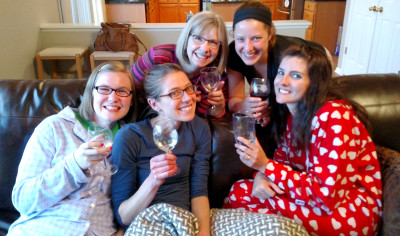One of the speakers I’ve had the pleasure of sharing the stage with at Discover is Jullien Gordon, a professional career coach and speaker who’s been featured in Forbes and Under 30 CEO. Jullien has some great lessons on developing your personal definition of success and going after what you want, rather than copying someone else’s definition of success – which may or may not make you happy.
When I went through the Discover program a few years ago, Jullien’s message really resonated with me. Even though I was doing things seemingly for myself at the time, I realized that I was actually doing things that I thought would make me seem successful in other people’s eyes – not because those activities were truly important to me. As I’ve defined what’s important to me and tried to let go of that “expectations” baggage, it’s really changed my priorities and made me a lot happier. Sure, my job is the same, but the way I approach it is completely different, and I feel like I’ve totally changed the way I look at balancing life.

During the Discover program, Jullien uses several analogies about cars; one of his key points is that “your life is your vehicle to design, drive, and maintain.” One analogy in particular compares driving a car to striving for success. If you want to go somewhere, you put the destination into your GPS and then you follow the directions your GPS gives you. But Jullien points out that many of us aren’t first taking the step to define success and decide where we want to go – an omission that he compares to getting in the car, pointing it in any random direction, and just flooring the gas to go as hard as you can, hoping you’ll eventually bump into success along the way. I love that example because I think so many of us can relate to it. It’s really simple to just keep working your butt off thinking that it will help you be successful, but all the hard work in the world won’t help you succeed if you’re ultimately going in the wrong direction for you.
As much as I love that concept, though, I have to somewhat disagree with that analogy. Sometimes, you don’t know where you want to go – and that’s okay too. Maybe you have a general idea of what you want, but you need to head in that direction before you can see what that area looks like and really decide.

Or maybe you have no idea what you want – in which case, driving in a bunch of different directions is actually a great way to try new things and figure it out. I wouldn’t suggest flooring the accelerator during that exploration, but I think that just because you don’t have a final destination in mind doesn’t mean that you should stay put. How are you going to know where you ultimately want to go if you don’t explore your options?
Our society focuses so much on knowing your five year plan and your ten year plan – and we think that the ability to articulate those is a sign of someone who “has it all together.” Well, I will be up front and say that right now I have no idea what my five year and my ten year plan is. I am incredibly happy with my life right now and the opportunities I’ve made for myself – and while I don’t want to be lazy, I’m okay with staying put for a little while. I’ve worked hard to get to this place, and I’m in no hurry to move on to the next thing. Is that so wrong?

I said in December that I wanted 2015 to be the year that I engaged in order to figure out my next goal, but I’ve realized that I’m actually pretty content right now with who I am without a master plan. For once, I feel like I can just take life as it comes instead of worrying about the big picture and where my actions are going to get me. I know what makes me happy and what doesn’t, and I’m getting better at saying no to the things that don’t make me happy, or otherwise figuring out a way around them. Maybe soon I’ll want to go explore, or even set a new goal and go after it full-force, but I take the fact that I don’t want to do that right now as a sign that maybe I’ve already reached my happy place destination (at least for now).
So, maybe I don’t know what direction to put into my GPS next… but I am having one heck of a great drive around town.

I think the one thing that his message doesn’t take into account (and yours does) is that people have more than one “destination” that can be defined as success. There isn’t one path that is the ‘success’ path or the ‘fulfilling’ path.
To that end, mashing the gas pedal in a random direction, watching everything go by, and then slamming on the breaks when you find something that truly excites you or makes you happy is certainly a strategy for success. It is essentially what I did. The difference is that it takes a certain type of person who is okay with a few U-turns or a few random trips through little sleepy towns to ultimately get to their happy place destination.
Jullien’s message definitely doesn’t say there is only one formula for success – it’s all about finding YOUR definition of success. Or do you mean that each person has themselves multiple ways they could go? I agree that going the long way around can require a lot of patience!
To me, it sounds like your mental attitude is transitioning from a systems-based approach to more of a principles-based approach. Perhaps?
A principles attitude is having a set of values that are of the utmost importance. The purpose of having these principles is to be able to live freely without necessarily abiding by a set of rules, procedures, objectives, or consequences. When an individual chooses to live by principles they decide/desire to internalize the principles to such a degree that whenever they make decisions in their life, they are able to pause and ask themselves, “how does this decision affect the principles I hold dear to me?”
The hard part, is learning, or desiring, those principles so much that they become us. But when we are able to internalize those values, then all of a sudden life looks totally different – even if we are still doing the same things! Now, should my values be the same as your values? My principles?
The interesting thing about Jullien Gordon, when I browsed (briefly) through his website, is while he claims to be living a life of greater freedom he doesn’t state what that freedom is. His freedom, and much of the freedom I hear talked about in the press and among my peers, seems to be a freedom from restraint – which is a dangerous thing. True freedom is freedom to responsibility, to the absence of coercion. (If I had a personal dialogue with Mr. Gordon over time, then perhaps I would realize what he really means by ‘freedom’)
What are good principles to have? Beats me. The Bible offers the ten commandments and two laws. The tenth commandment might be the most important or perhaps the laws. Some more secular principles might be –
– to abstain from the use of coercion
– to always seek improvement
– to seek the double-win in all interactions in life
– to seek responsibility
– to respect private property
– fairness
– truth
– peace
some of those may be over-lapping, just trying to give different perspectives
YES to the values-based approach to life. The idea is that if you are clear on your values, it makes choices easy because you can think about which choice is more at the heart of your values.
For me, freedom is about being able to do what I want rather than feeling forced in a particular direction. It doesn’t mean I can be irresponsible, or that I should be selfish. But I think it’s easy to get caught up in some base expectations that actually aren’t true requirements – for example, striving to get a top rating at work every single year. If you aren’t trying to make partner (or otherwise progress through the firm), then why are you killing yourself to be a top performer? For me a huge takeaway from this program was identifying things that I had assumed were required but were actually just things I hadn’t before questioned. When I started to question requirements, I found that I had a lot more freedom than I previously thought possible.
Hi Laura,
Your piece about not having such a rigid life and direction, eschewing a five year plan and the like, struck a note with me. A few years ago I was a member of a networking organization and one of the members who considered himself a life coach, had a workbook he sold as part of a system he came up with to help people plan their success. I purchased this workbook and started to fill it up. I was doing fine until I got to a section where a scenario was put forth that required me to imagine myself in five years, being the guest of honor at a dinner held for me. The exercise was to write the speech I would be giving in front of all the invited guests, including friends and family. I was stuck! I couldn’t imagine myself in that situation and couldn’t come up with a single reason why there would be a gathering to celebrate anything I did.
That essentially put an end to that silly and useless exercise. There are plenty of so called “life coaches” who try to sell the notion that if you envision yourself successful and carefully create a strategic plan to achieve this plan in a specific timetable, you’ll achieve it. Well, I don’t believe that bunk and I further agree with you that this plan and life direction assignment is counter productive and limiting.
There are so many examples of successful people who delved in many varied experiences and professions and have had a much fuller and satisfying life than those that planned every minute of it and spent many years hating what they do.
All the best,
Bari
I think the planning exercise CAN be incredibly helpful, but it only works if you already have clarity on your goals. If you have a goal in your mind and you want to reach it as fast as possible, you absolutely need to have a gameplan for how you’re going to make it happen. To that point, I think Jullien’s message is absolutely spot on.
But if you DON’T have a goal yet, I think it’s important to identify why you want to come up with one. If you’re unhappy with your life as it is, then I think it’s really important to come up with a goal for how you can start changing things around to be happier. But if you’re perfectly content where you are (as I am now), then I think a goal and a plan is less necessary. It’s more about continuing to stay where you are without getting swayed by things that might change the status quo. It sounds like you’re in that place too, so congrats!